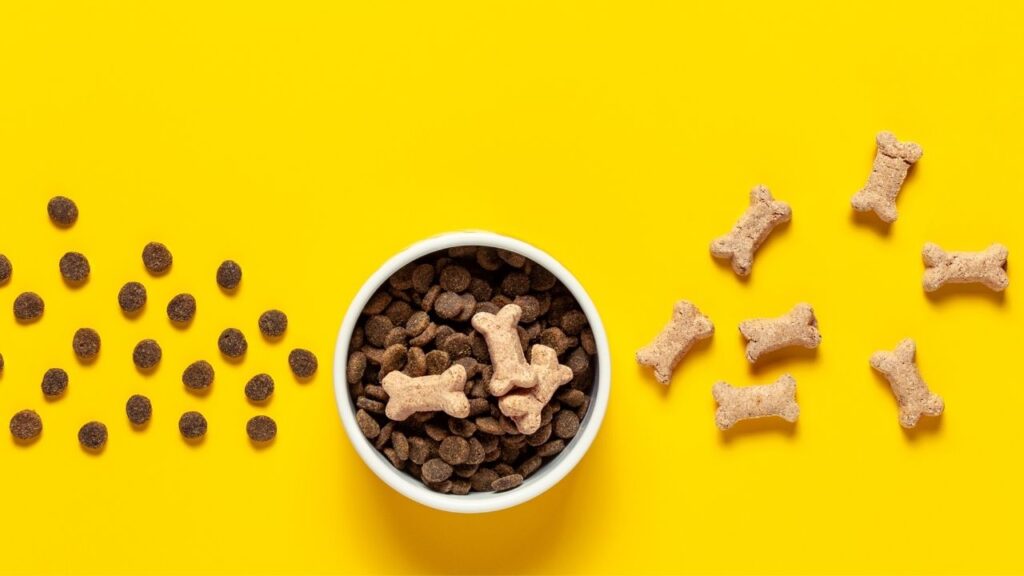A high-fat, low-carb diet that nearly eliminates glucose from your dog’s body, giving their cancer cells fewer sugar molecules to thrive and feed off of. Too good to be true? This diet does come with some potentially dangerous side-effects.
Key Takeaways
- The best anti-cancer diet for dogs is one that is complete and balanced and that your dog wants to eat.
- Keto diets may be able to slow cancer growth, but more research is needed to know for sure and how much.
- Cancer can survive ketosis, although cancer cells prefer using glucose (sugar from carbs) for energy.
- Carbs are not necessarily bad for dogs with cancer. Yes, certain cancer cells prefer to use carbs for energy, but your dog’s normal cells also benefit from carbs as an energy source. Some carbs in the diet can be helpful for many dogs.
What is a Ketogenic Diet?
Countless foods, supplements, and nutritional profiles have been touted over the years as possibly having anti-cancer properties.1 Ketogenic, or “keto,” diets for dog cancer are no exception.
While there’s no regulated or strict definition of what constitutes a keto diet, it is generally one that consists of very few carbs, very high levels of fat, and moderate levels of protein.
Although it regained popularity in recent years, the keto diet is nothing new. Its recorded use dates all the way back to Ancient Greece, and its clinical use started in the 1920s and 1930s as a way to treat epilepsy in human patients.3
What is relatively new is the push to apply a keto diet to our canine counterparts.4 Most dog food on today’s market is heavy on carbohydrates, automatically disqualifying them from being “keto friendly.”
Home prepared keto recipes are becoming more readily available online2 and dog food companies are quickly working to fill the keto gap with commercial options.
Ketosis: Powering the Body with Ketones
Cells in your dog’s body typically convert carbohydrates into glucose (a sugar molecule). This glucose is either immediately used or stored away in the body as glycogen for use at a later time.
When the body no longer has any glycogen to pull from for energy, it enters a state of ketosis, where it runs on short fatty acid chains from fat called ketones rather than on glucose from carbs.
Evidence for Using a Ketogenic Diet for Dog Cancer
The theory of why a ketogenic diet might be beneficial to dogs comes down to the metabolism of cancer cells versus the metabolism of healthy cells.
All cells need an energy source to grow and proliferate. Numerous studies over the last 60 years have found that cancer cells consume glucose more than healthy cells do, and that glucose is important for tumor survival and metastasis.1,4
This preference for glucose is largely because cancer cells aren’t able to conduct oxygen-based respiration like healthy cells can and are therefore unable to harness energy from fat. This causes them to be dependent on glucose and, to some degree, glutamine from protein.4
Based on this logic, cancer cells can theoretically be “starved” by eliminating glucose from the body, which can be accomplished by removing carbohydrates from your dog’s diet.
Research on the ability of the keto diet to be “anti-cancer” is lacking, particularly in regards to its long-term effects. However, there have been some notable results found among studies testing the effects of ketogenic diets on mice with cancer.
Mouse Studies
One study involved mice diagnosed with malignant glioma who were receiving radiation therapy.6
- One group of mice was given a standard control diet and the other was fed a ketogenic diet.
- The mice who were given the ketogenic diet had a median survival time of 5 days longer than their standard diet fed counterparts.
- No remaining tumor masses could be detected in 9 of the 11 mice in the experimental group by the end of the study, and no tumor reoccurrence was noted even after the mice were switched back to the standard control diet for a time period of 200 days.
Another study involving mice with metastatic cancer fed them either a ketogenic or control diet.7 Results indicated that the ketogenic diet decreased blood sugar, slowed tumor growth, and increased mean survival time by 56.7% in comparison to the control group.7
The mice in the experimental group for this study were further split into a group that received hyperbaric oxygen therapy and a group that did not. The mice that were given hyperbaric oxygen therapy in addition to the ketogenic diet had a decrease in blood sugar, slowed tumor growth, and improved their mean survival time by 77.9% compared to the control group fed the standard diet.7
Anecdotal Evidence in Dogs
Most evidence pertaining to the efficacy of a ketogenic diet in fighting dog cancer is anecdotal. Stories abound online about dogs who had miraculous recoveries from cancer after being switched to a keto diet.
While some of these stories may be true, we often don’t know what other therapies each dog might have received before or after switching to a keto diet. Different people also have wildly different definitions of what makes a keto diet keto, and ingredients can vary dramatically. All of these factors can also play a role in the dog’s health.
When to Not Use Ketogenic Diets for Dog Cancer
Some view the keto diet as a generally unscientific approach to nutrition that’s only resulted in an increase in obesity, type-2 diabetes, heart disease, and cancer in humans.1 One study that required human patients to maintain a state of ketosis for one year found a dangerously substantial increase in their cholesterol levels.9
Starting your dog on a ketogenic diet will likely result in similar symptoms as experienced in humans, including several days of weakness, lethargy, nausea, and constipation.8 This combination of symptoms is sometimes referred to as the “keto flu” and is thought to happen because of the body entering ketosis.
Your dog will likely exit this stage and symptoms will resolve once their body adapts to using ketones for energy instead of glucose. However, keeping your dog in a state of ketosis may lead to muscle loss, a decrease in microbial diversity in the gastrointestinal tract, and problems associated with overall nutritional deficiencies.5
In extreme cases, your dog may develop pancreatitis due to the increased fat in their diet.
There are some cases in which your veterinarian may starkly warn against a keto diet. For example:
- Dogs with kidney cancer are not good candidates for a ketogenic diet. In a study that investigated using a ketogenic diet in mice with kidney tumors, the tumors actually grew.10 Increased protein in the diet can also put excess strain on the already damaged kidneys.
- A keto diet is likely not a good option for dogs who are underweight or suffering from a loss of appetite due to their cancer or cancer treatments. Keto diets are typically lower in calories and being in a state of ketosis can reduce your dog’s appetite.4 Your dog may also need carbs as an easier energy source.
- A dog with cancer needs to eat nutritionally dense and calorically balanced foods. Starting keto with a dog who is already nutritionally compromised may only worsen their condition.4
So, What Should I Feed My Dog?
Some dog owners posit that wolves, the ancestors of our family dogs, ate a keto diet and therefore it should be safer or more natural for dogs. Whether that is true or not, it’s not simple and easy to create a keto diet at home that is also nutritionally balanced.
Keep in mind that many of the canine keto diets outlined for dogs online and available with a quick Google search are written by people who don’t have nutritional or clinical training.4 You should speak with your veterinarian about your dog’s specific needs and health-related goals before you change their diet, especially if you are considering a keto diet.
Your dog’s optimal nutritional profile is likely just as unique as they are. A “one size fits all” approach rarely, if ever, works for dog cancer.
Even keto diets vary in their composition. They can range anywhere from 70-90% fat, 6-35% protein, and 2-10% carbohydrates.5 This wide range makes it difficult to compare the few studies that we do have.
They also vary widely on the food sources. Some diets use healthy foods to get the desired macronutrient profile, and other diets use “junk” foods to get that same profile. Nutrition matters, and a diet filled with junk food will be deficient in nutrients, even if it is “keto” on the macro level.
There are many “anti-cancer” dog diets out there. What you should feed your dog is ultimately up to you and your veterinarian. While some owners swear by the power of keto, there are other better researched and more substantiated diets that aren’t associated with so many negative effects.
If you do decide to feed your dog a keto diet, you should transition very slowly over the course of 10 to 14 days so that your dog can adjust to the increased fat in the diet.
My Dog is Eating a Keto Diet. Should I Switch?
If your dog is on a keto diet, appears to be doing well, and can tolerate calorie restriction as well as high fat levels, then it may be okay to keep their diet as is.
There are some benefits of the body running on ketones as opposed to glucose, but this has only been demonstrated short term.4 Longer term studies in humans have demonstrated negative effects.3 You should also have your dog’s diet analyzed by a veterinary nutritionist to make sure that she is getting everything she needs.
Arguably, the ultimate benefit of a ketogenic diet is reducing carbohydrates in your dog’s diet. Remember, cancer cells love carbs, so minimizing them is a common thread in many anti-cancer diets. Your dog does not have to go into ketosis to reap these benefits and, therefore, probably doesn’t need a strict ketogenic diet.4
Regardless of what diet you choose to feed your dog, the most important thing is that it is complete and balanced and provides your dog with all of the nutrients that her body needs to be healthy.
- Allen BG, Bhatia SK, Anderson CM, et al. Ketogenic diets as an adjuvant cancer therapy: history and potential mechanism. Redox Biol 2014;2:963-970.
- McKenzie B. Is Keto Kind to pets? Veterinary Practice News. https://www.veterinarypracticenews.com/ketogenic-february-2020/. Published January 28, 2020. Accessed April 16, 2023.
- Wheless JW. History of the ketogenic diet. Epilepsia. 2008;49(s8):3-5. doi:10.1111/j.1528-1167.2008.01821.x
- Dressler D. Keto Diet for dog cancer … good idea or bad idea? DogCancer.com. https://www.dogcancer.com/perspectives/diet-and-lifestyle/keto-diet-dog-cancer/. Published February 21, 2023. Accessed April 16, 2023.
- Crosby L, Davis B, Joshi S, et al. Ketogenic diets and chronic disease: Weighing the benefits against the risks. Frontiers in Nutrition. 2021;8. doi:10.3389/fnut.2021.702802
- Abdelwahab MF, Fenton KE, Preul MC, et al. The ketogenic diet is an effective adjuvant to radiation therapy for the treatment of malignant glioma. PLoS One 2012;7(5):e36197. (https://pubmed.ncbi.nlm.nih.gov/22563484/)
- Poff AM, Ari C, Seyfried TN, D’Agostino P. The ketogenic diet and hyperbaric oxygen therapy prolong survival in mice with systemic metastatic cancer. PLoS One 2013;8(6);e65522. (https://www.ncbi.nlm.nih.gov/pmc/articles/PMC3673985/)
- Campos M. What is Keto Flu? Harvard Health. https://www.health.harvard.edu/blog/what-is-keto-flu-2018101815052#:~:text=The%20so%2Dcalled%20keto%20flu,is%20not%20recognized%20by%20medicine. Published October 18, 2018. Accessed April 16, 2023.
- Mosek A, Natour H, Neufeld MY, Shiff Y, Vaisman N. Ketogenic diet treatment in adults with refractory epilepsy: a prospective pilot study. Seizure: The J of the British Epilepsy Association 2009;18(1):30–33. (https://pubmed.ncbi.nlm.nih.gov/18675556/)
- Liśiewicz AD, Kasprowska D, Wojakowska, et al. Long-term high fat ketogenic diet promotes renal tumor growth in a rat model of tuberous sclerosis. Sci Rep 2016;6:21807. (https://www.ncbi.nlm.nih.gov/pmc/articles/PMC4759602/)
Topics
Did You Find This Helpful? Share It with Your Pack!
Use the buttons to share what you learned on social media, download a PDF, print this out, or email it to your veterinarian.






